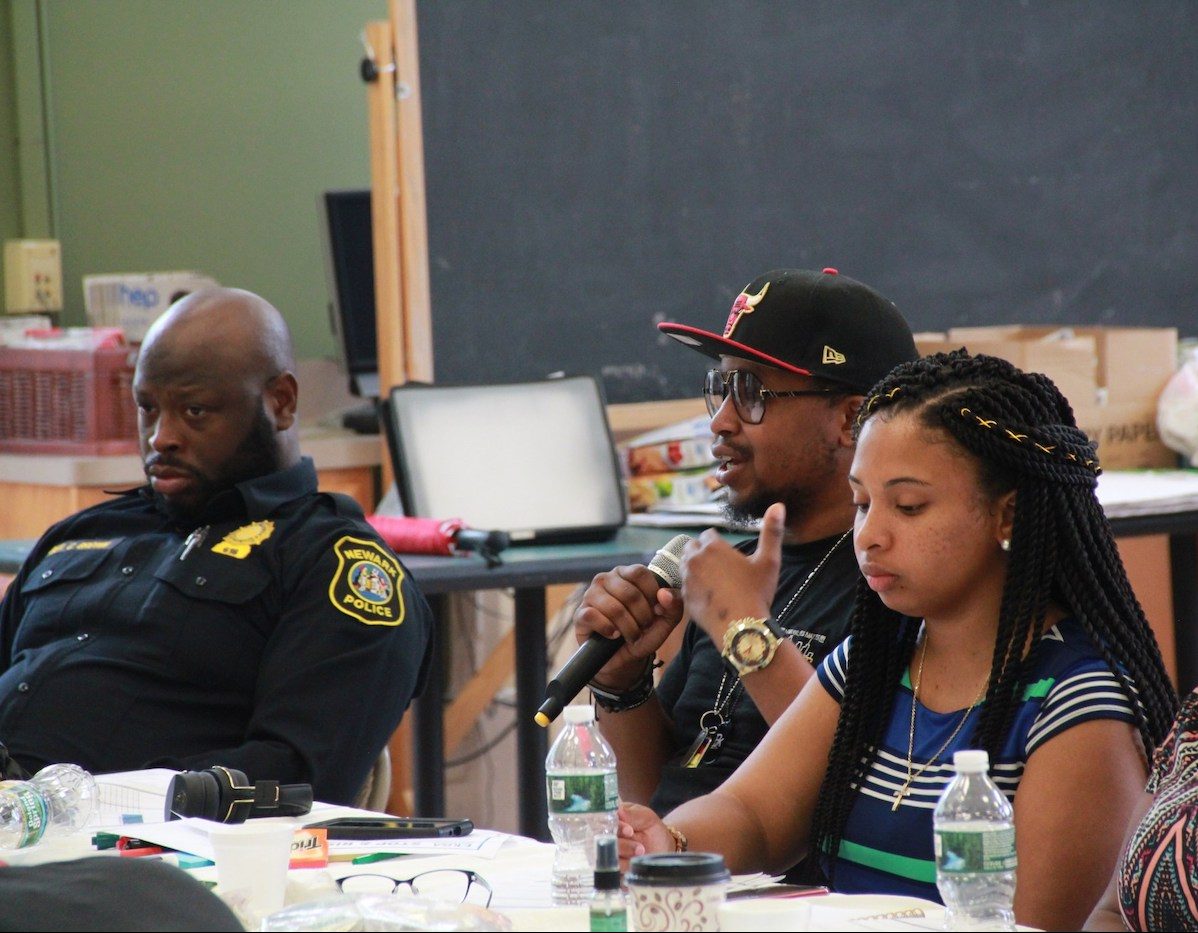
Over 500 police and community members have completed in EJUSA’s Trauma to Trust program. Click here to learn more and participate.
Summer sunlight poured through tall windows into the community room of a historic Newark building this past June. Long tables formed something like a horseshoe, with chairs lining the outer perimeter. A large projection screen sat at the end.
Men and women of all ages trickled into the room. Many of them peeled off hoodies, collared shirts, even a Yankees jersey to reveal the uniform of the Newark Police Department (NPD). Without a word of instruction, they filled all the seats on one half of the room. On the other side sat Newark community members, activists, and a few newcomers to the city.
Day one of Trauma to Trust, a police and community training program, was about to begin. For the next 16 hours, those in the room would open up about the trauma they had experienced through interactions with the police, the stress of being “on the job,” the ways that relationships could be made strong, and what kind of changes could create community safety without leading to more arrests.
Trauma to Trust is about creating empathy and understanding around trauma—the kind that occurs every day as well as the historical trauma that continues to affect all generations of people of color. This sharing of experience is hard work and requires vulnerability. So the way the police took over one side of the room, creating a dividing line between them and the community was not ideal. But it’s also not unexpected.
“Trauma to Trust is engineered to challenge bias,” said Monique Swift, EJUSA’s lead facilitator in the June sessions. “Police are biased against the community, and the community is biased against police. More often than not, trauma is the foundation of those biases. That’s why Trauma to Trust is so effective. We expose the trauma and explore it. We’ve seen over and again that the exposure leads to the opportunity to heal and ultimately transform the relationship.”
Trauma has not traditionally been a part of police training anywhere, at any time, in the U.S. But the NPD has been operating under a consent decree, an agreement reached in 2016 between the city and the U.S. Department of Justice in response to allegations of “unconstitutional stops, searches, arrests, use of excessive force and theft by officers” against people of color. The Trauma to Trust trainings are one approach that the NPD and community have identified and implemented to address the circumstances which led to the consent decree.
Darren Miller has lived most of his life in Newark. Once formerly incarcerated, he is today a violence intervention worker for the Newark Community Street Team (NCST), where he mentors about 15 young people. “This is my calling,” he said, after the trainings.
The June sessions were his second round of Trauma to Trust. “For me this was a healing process,” said Darren, who explained that he’d been beaten by police when he was arrested and again while in prison by corrections officers. “I wanted to be able to be a voice, as a person who has been locked up, who has dealt with trauma. And I wanted to be a healing agent where we would work together.”
Edith Muhammad brought a unique experience to the trainings. Her father was murdered when she was a child. A couple years after graduating from college, she spent seven years in the NPD, ultimately leaving to take care of her son. “As an outsider looking in, I see the NPD having these conversations as almost revolutionary, to talk about trauma and public trauma,” said Edith, who just took a job with NCST working in its hospital-based violence intervention program. “We’re not going to arrest our way out of crime. We have to make communities safe without destroying them.”
Edith isn’t the only participant to describe what’s happening in these rooms as revolutionary or similar. Each training session brings up new questions that are creating a shift in perspective from “What’s wrong with you?” to “What happened to you?” It’s in that shift that the possibility for empathy and understanding lives. Only when we achieve that can we start building a shared vision for what public safety—that embraces racial equity and violence prevention—can look like.

The program is drawing national notice. A team of community members from Baton Rouge, Louisiana, joined the June trainings because they’re doing their own work on police and community relations. Nicole Scott founded the Bridge Agency INC nearly three years ago. She, like everyone in the Baton Rouge group, paid her own way to come to these trainings.
“I was expecting to attend a seminar where we were taught,” said Nicole. “What we got was far more enriching. We saw law enforcement with community, taking time to talk with each other, learning about each other’s sides. I wished some of our officers were in that room so that they could see that mutual dialogue can take place and be respected.” She paused. “That was life changing.”
And that’s the point of working to reduce violence and also change the way we respond to it. There’s no doubt this work can save lives. But it can change many more lives by relieving many communities of constant violence.
As the sessions wrapped up, and participants shared their takeaways, Edith talked about what that means, for her and for all of us. While there many things that exist to give us the impression that we’re safe—an alarm system, a weapon, and, yes, over-policing—what we really need is something much simpler. “I want to be safe because I live in a safe place.”
Click here for more information on EJUSA’s Trauma to Trust program. To participate in this fall’s upcoming training, sign up here.



